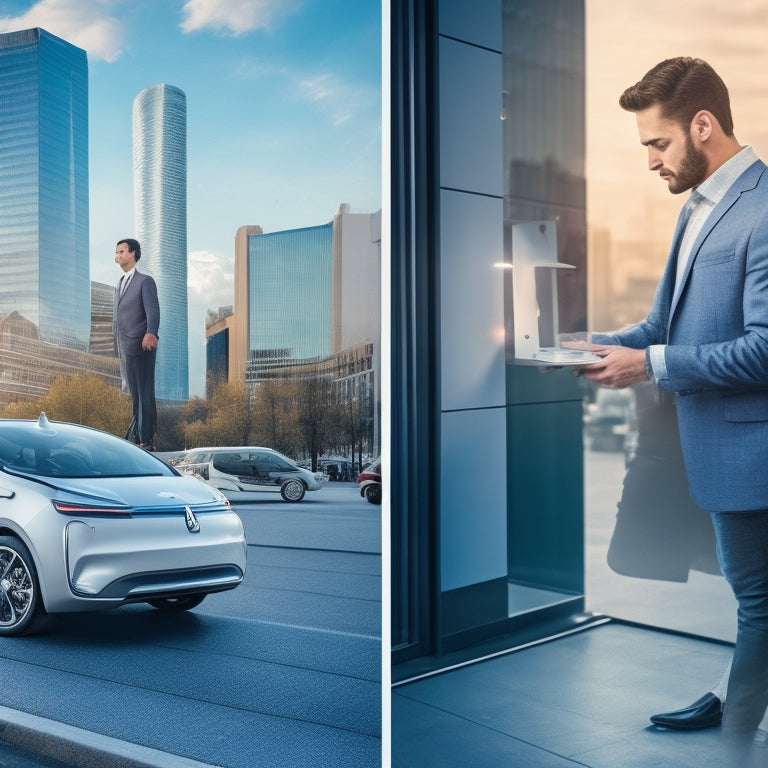
Electric Vehicle Dilemma: Lease or Purchase Today
Share
The decision to lease or purchase an electric vehicle (EV) is filled with complexities, influenced by factors such as cost, lifestyle, and technological advancements. EV benefits include quiet operation, efficiency, and reduced maintenance, yet drawbacks like varying charging station availability and range limitations must be considered. Cost considerations including total ownership costs, average prices, and hidden expenses like registration fees and insurance premiums also play a significant role. As the EV market continues to evolve, understanding the implications of leasing versus ownership, battery mineral sourcing, and personal preferences is essential in making an informed decision, and further exploration can reveal a nuanced understanding of the electric vehicle dilemma.
Key Takeaways
• Consider your driving habits and budget to determine whether leasing or purchasing an EV is more cost-effective for you.
• Leasing allows you to adapt to rapidly evolving EV technology, but forfeits ownership advantages like tax credits.
• Weigh the overall cost of ownership, including hidden costs like registration fees and higher insurance premiums, when making your decision.
• Assess the importance of flexibility and long-term commitment when deciding between leasing and purchasing an EV.
• Evaluate the total cost of ownership, including lower operating expenses, to make an informed decision.
EV Benefits and Drawbacks
While electric vehicles (EVs) offer numerous advantages, including their quiet operation, efficiency, and reduced maintenance requirements, they also come with limitations, such as varying charging station availability and range limitations affected by factors like extreme temperatures and charging habits.
The charging infrastructure, although expanding, still presents a challenge, particularly in rural areas. Additionally, EV owners must consider the impact of extreme temperatures on their vehicle's range, which can affect daily commutes and road trips.
Furthermore, maintenance costs, although lower than those of traditional vehicles, can be influenced by hidden fees, such as registration fees and higher insurance premiums. Understanding these benefits and drawbacks is essential for making an informed decision when considering an EV purchase or lease.
Cost Considerations and Incentives
Determining the total cost of ownership is essential when deciding between purchasing or leasing an electric vehicle. The average price of around $76,000 in the U.S. can be offset by lower operating expenses and government incentives.
While EV owners spend less on charging compared to gas cars, hidden costs such as registration fees and higher insurance premiums must be considered. Tax credit eligibility also plays a significant role, with criteria including EV assembly, purchase price, and income.
Understanding these factors can help offset upfront costs and boost sales. By carefully evaluating cost considerations and incentives, potential EV owners can make an informed decision that suits their financial situation.
Weighing Leasing Against Ownership
Flexibility and long-term commitment are two essential factors to take into account when evaluating the pros and cons of leasing versus owning an electric vehicle. They greatly influence the overall cost of ownership and the ability to adapt to rapidly evolving EV technology. Leasing offers flexibility, allowing drivers to switch to newer models as technology advances, while ownership provides long-term control and potential long-term savings.
However, ownership advantages, such as tax credits, are forfeited when leasing. On the other hand, leasing flexibility enables drivers to adapt to changing technology without being tied to a specific model. Ultimately, weighing the benefits of leasing against ownership requires careful consideration of individual needs and priorities.
The Impact of Battery Minerals
Nearly 80% of the world's lithium, an essential battery mineral, is mined in just three countries, highlighting the importance of responsible sourcing and supply chain management in the electric vehicle industry. The impact of battery minerals on the EV industry cannot be overstated.
-
Responsible sourcing of critical battery minerals is essential for sustainable EV production.
-
Trade agreements affect the availability and cost of these minerals, influencing the trade impact on the industry.
-
The supply chain of battery minerals has a direct impact on EV production, making sustainable mineral extraction necessary.
- The battery mineral supply chain's environmental and social implications must be considered in the industry's pursuit of sustainability.
Navigating the EV Decision
As the electric vehicle market continues to evolve, prospective buyers face a critical decision: whether to lease or purchase an EV, a choice that depends on various factors, including budget, driving habits, and personal preferences. To navigate this choice, it's crucial to take into account current EV market trends and purchase considerations. Understanding the average EV price, hidden costs, and tax credits can help buyers make an informed decision.
Additionally, factors such as charging station availability, range, and quality of EVs should be taken into consideration. By weighing these factors, prospective buyers can make a decision that aligns with their lifestyle and budget, ensuring a smooth shift to electric vehicle ownership.
Frequently Asked Questions
Can I Charge My EV at a Friend's House Without Their Permission?
"While it may be tempting, charging your EV at a friend's house without permission is a breach of EV etiquette, violating home access rules and potentially straining relationships, emphasizing the need for mutual understanding."
How Do I Dispose of My Ev's Battery Pack at the End of Its Life?
At the end of its life, EV battery packs require responsible disposal through certified recycling facilities, mitigating environmental impact and promoting sustainable battery recycling practices to minimize waste and conserve critical minerals.
Can I Use a Level 2 Charger With a 120-Volt Outlet?
When using a Level 2 charger with a 120-volt outlet, make sure charger compatibility and outlet safety by verifying the charger's voltage and ampere ratings, and confirming the outlet can support the charger's power requirements to prevent overheating and electrical hazards.
What if I Need to Drive an EV in an Area With Limited Charging Infrastructure?
"While driving an EV in areas with limited charging infrastructure, range anxiety is heightened; however, many manufacturers offer roadside assistance services, providing peace of mind and mitigating concerns about being stranded without a charge."
Are There Any EV Models That Use Alternative Battery Chemistries?
Several EV models are exploring alternative battery chemistries, including solid-state batteries and sodium-ion batteries, which offer improved safety, range, and sustainability, with companies like Fisker and NIO leading the charge.
Related Posts
-

Why Choose Recycled Paper for Earth-Conscious Business?
By choosing recycled paper, you'll greatly reduce your business's environmental impact. You'll lower your carbon foot...
-

5 Efficient Air Circulation Methods for Green Homes
You can utilize the power of natural ventilation techniques, whole house fans, and solar-powered ventilation systems ...
-

Why Biodegradable Dish Soap Matters for Earth-Conscious Homes
You likely don't realize that the dish soap you're using today will still be harming the environment long after you'v...


